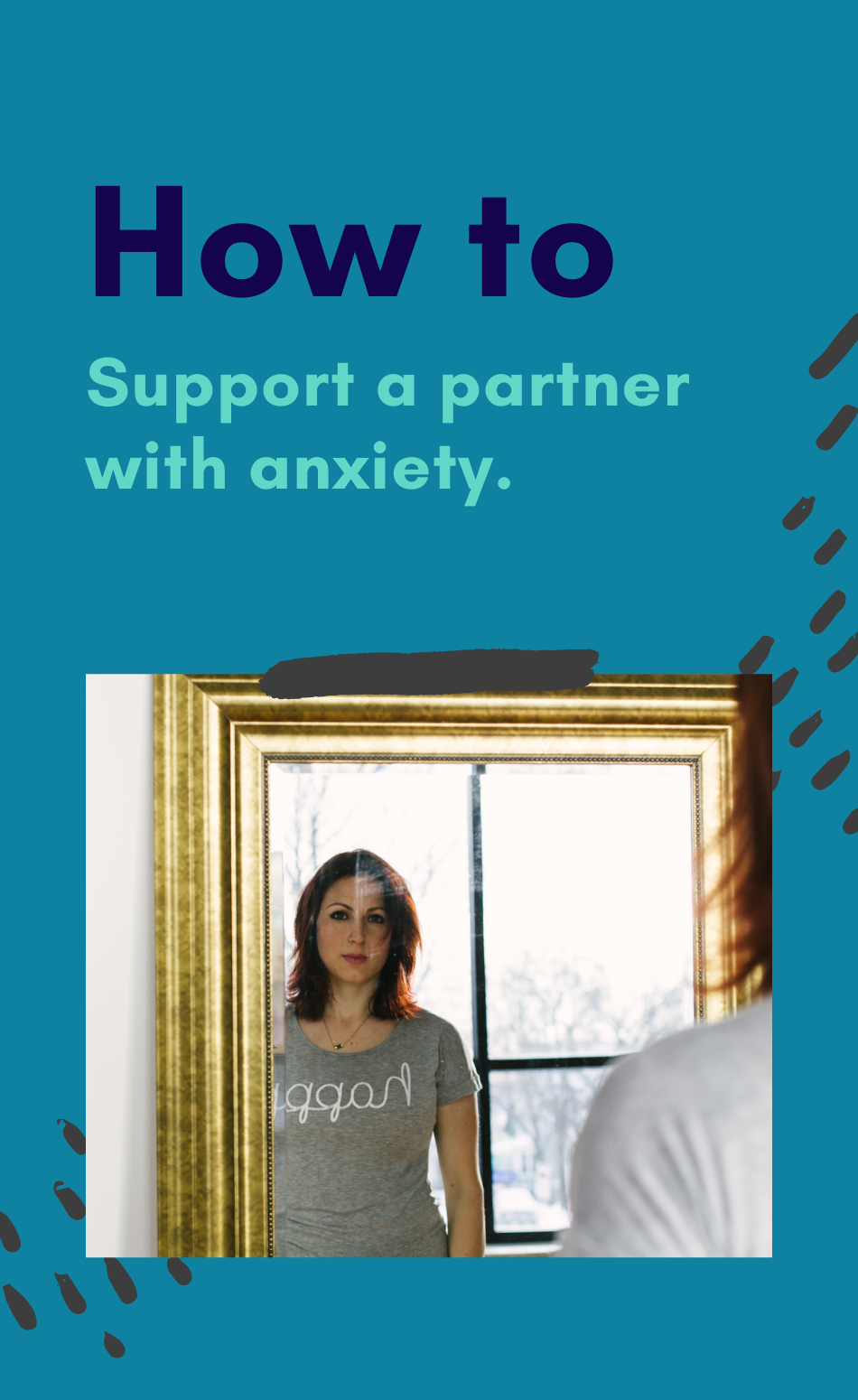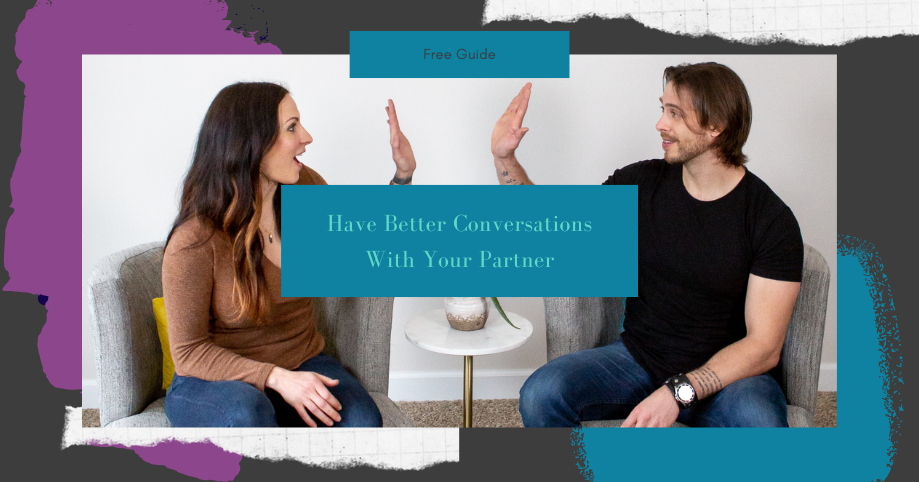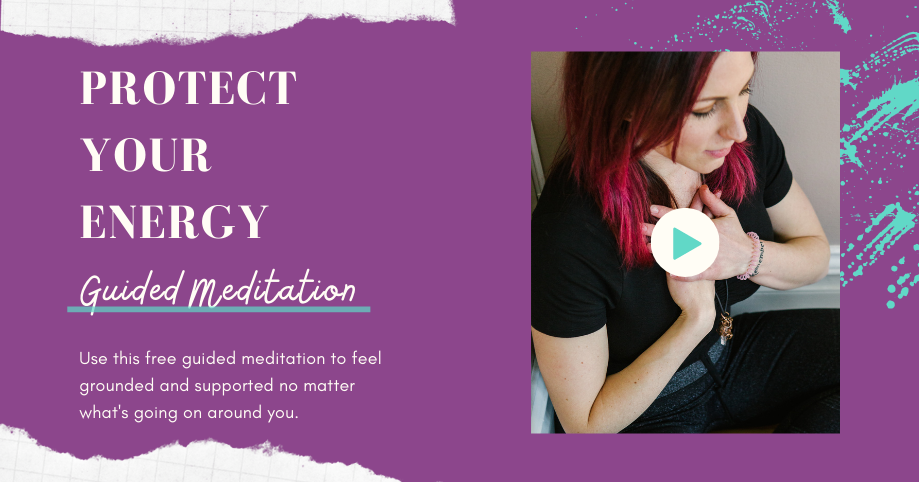Want to listen to this post on the Podcast? Click the link below:
Anxiety is a tricky emotion, especially when it happens to your partner. Chronic anxiety can begin to negatively affect your conversations, your ability to interact healthily with one another, and your relationships’ support structures. It’s important to understand how to support a partner with anxiety so your partner is able to process their emotions and you’re able to feel grounded and taken care of in the process as well. There are a few key strategies to understand – but first – let’s examine the emotion.
Understanding Anxiety
Anxiety is the body’s response to worry and fear.
Anxiety is a normal and even healthy emotion. In small amounts, anxiety motivates us to make better decisions and stay in integrity with our values systems. Our bodies are meant to react to our worries and fears – so in many ways, anxiety can be really healthy.
Anxiety becomes unhealthy when it’s prolonged, heightened, or disproportionate to the reality of a situation. This includes symptoms like:
• constant worry about things outside your control
• Fear or phobias that affect your ability to interact with others or perform at work
• Spin-outs into worry or anger over small stressors throughout the day
According to the National Alliance Of Mental Illness, anxiety disorders are the most common mental health concern in the United States.
Over 40 million Americans are afflicted by anxiety, so if your partner is one of them, they are certainly not alone! Here are some of the feelings and bodily sensations associated with anxiety. A basic understanding of your partner’s physical and mental state will help you support them when the anxiety is happening.
Body sensations:
Anxiety experiences can vary, but many people report bodily sensations on two different spectrums:
- A feeling of electricity and hyper-arousal. Imagine your body’s nervous system is lit up like a fiber-optic Christmas tree with each nerve ending sizzling with energy and discomfort.
- A state of numbness and disconnection. The stress response is exhausting, so many anxiety-sufferers disconnect from the stress-feelings in the body and feel completely numb, as if their head were floating independently of their body.
Mental state:
On a mental level, in a full-on anxiety episode or attack, your partner’s thoughts might be moving way too fast for them to be able to tell you what’s going on. When this happens, the anxiety-sufferer is ‘off in another world’ and will often need help to come back to the world you’re living in with them.
It’s important to remember: it’s not your responsibility to ‘fix’ or ‘mend’ the anxiety emotion. If you want to support your partner in the process, it’s important to take a few steps first in order to be helpful in a way that’s healthy for both of you.
Here are some action steps you can take to support a partner with anxiety:
1. Have an open conversation about the anxiety when our partner isn’t anxious.
One of the healthiest and most supportive things you can do for your partner is to speak openly and without judgement about their anxiety. It’s important to make sure this is done gently and supportively, when your partner is not in a high-anxiety state. I’d recommend asking questions to open the conversation – such as: I’ve noticed you’ve been feeling some extra stress over _____ lately. Want to talk about it?
2. Develop a support plan together.
This is the most powerful way to support a partner with anxiety. Ideally the two of you would develop an anxiety support-plan together. Creating a plan together helps your partner feel loved, seen and taken care of in the process. One important note here: If you try to make a support-plan without your partner knowing, it will NOT go well. Start at step one and have a conversation about it so you can understand what your partner wants and needs. If you decide to try to ‘fix’ your partner’s anxiety with a plan of your own without them knowing, they’re probably going to feel pressure from you to ‘hurry up and fix it’ which can heighten the anxiety response.
A support plan might be as simple as: Operation Disney Movie Night! Or, an invitation to go outside for a walk.
Some of my favorite healthy suggestions for dealing with anxiety include:
- Any type of gentle movement– dancing, walking, or biking are great.
- A change of environment, like going for a drive or moving to another room in the house, or sitting in the backyard.
- One for your anxious partner (that you can prompt them in to) is environment recognition. Since anxiety takes you out of the here and now, your partner can re-anchor themselves by looking around their immediate environment and identifying things: that cup is cream with blue words on it, That’s a green succulent in a brown pot, the grey house across the street has white trim etc. etc. This could be prompted by a partner or done individually by the anxious partner.
- A mindful sensory experience. Smells, physical touch, and tastes can gently bring the brain back to the present. A light massage, cold shower, bath with aroma-therapy, or a comforting, fragrant soup can all help ease the anxious feelings. (A note here: all of these activities can be done mindlessly, so it’s important to slow down and try to sink into the experience. Ask your partner if this is a good strategy for them before deciding to try to implement it).
- A funny show or light movie might do the trick.
- Peaceful music paired with some gentle yoga.
- Supplements like magnesium or Cenitol (which I have lovingly called chill-the-fu*$-out powder).
- High-intensity exercise, like sprints, burpees, or a short HIIT workout can be a quick-fix for certain personality types with anxiety.
It’s important that you both take into consideration your personality types and what will feel natural and doable for each of you. Make your plan realistic and unique to who each of you are and how you want to show up for each other.
3. Encourage finding professional help (if it’s chronic/repeating/getting worse/negatively affecting your life together). Sometimes even the best laid support plan will fail. We are not meant to figure everything out on our own, so professional support is often an essential part of anxiety support for your partner. Encourage your partner to get help, and be open to talking about what they learn about themselves in their sessions. A mental health professional might be the best way to come up with a support plan for your partner.
4. Understand your own feelings. This is a big one. You’re in this relationship too, and your feelings matter just as much as your partner’s. Monitor your own feelings while you’re attempting to support your partner with anxiety and make sure you take the time you need to feel supported in your life as well. You will not be able to support your partner if you aren’t getting the support you need for yourself, so make sure you’re taken care of first. I recommend this simple (free) meditation linked in the image below for supporting yourself when your partner has anxiety so you can feel protected, grounded and calm.



View comments
+ Leave a comment